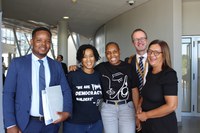Conference: National and Provincial Elections in May 2024: What are the Implications for Intergovernmental Relations?
Current public debate and discussions in South Africa on the upcoming elections is on which party will win the elections, in the event that no party secures the majority at national or provincial level, what are the possible coalitions partners and who will become President. There is limited focus on how the outcome of the elections will impact the operations of the state from an intergovernmental relations, among other issues. New insights and learnings were shared on this topic in this seminar presented by four panel experts: Ms. Thembi Nkadimeng (Minister of Cooperative Governance and Traditional Affairs), Professor Emeritus Nico Steytler (DOI), Ms. Tessa Dooms (Director, Rivonia Circle), and Professor Tinashe Chigwata (DOI). The Conference was facilitated by Professor Jaap De Visser (SARChl Chair in Multilevel Government, Law and Development).
Specifically, considering the high possibility of no party winning the elections with an outright majority at both national and provincial levels, Prof Chigwata (Head of the Multilevel Government Unit at the DOI) raised the question of whether the current IGR system is robust enough to handle whatever political changes may occur after the May elections. In her speech, Minister Nkadimeng, similarly acknowledged this challenge, highlighting the formidable challenge that coalition governance has caused and continues to cause to service delivery. She recommended that coalitions be regulated. Aside from regulating coalitions, the Minister emphasised that a complete system redesign of the IGR system is unnecessary. She emphasised that what we do need is a bible-like book or guide to drive development and growth, something which the District Development Model attempts to provide.
The provision of service delivery, as Professor Steytler pointed out, is contingent upon cooperative governance across the three spheres of government and positive intergovernmental relations. Like the Minister, Steytler wondered how coalition governments would influence governance across the country in light of the political instability and subpar service delivery that had characterised previous experiences with such administrations at the municipal level. In the context of IGR, Steytler pointed out that the outcome of the May national and provincial elections may influence existing coalitions at the local level – e.g. metros – rearrangements. The formation of provincial delegations to the National Council of Provinces and the acquisition of a mandate from a coalition-led provincial legislature will also be difficult to obtain. Steytler pointed out that political differences between provinces and distressed municipalities are likely to further tensions resulting in more unsuccessful interventions. He thus proposed that we need to rethink the process of interventions to make it apolitical by using, for example, independent institutions to provide uncontested information on which interventions could be based.
Since "our politics is determined by the systems and institutions that run it," Ms. Tessa Dooms, who looked at IGR from a citizen's perspective, welcomed the debate on this topic. She pointed out several shortcomings associated with our electoral system. The first is that there is no direct relationship between citizens and the executive (citizens have no say in who becomes the President or forms part of the executive across government). Secondly, there is no platform for citizens to engage in IGR institutions. As it stands, IGR is limited to the arms of the state.
Ms. Dooms agreed with the Minister that a "bible for development" would help guide future development. She made it clear that this is not the Constitution, which merely instructs us on what to do but not how to accomplish it. Ms. Dooms further called on government, especially in the current politically charged climate, to depoliticise and professionalise the public service to ensure the reliability of services. She ended by stating that South Africa has too many politicians and departments which makes coordination, a key principle of intergovernmental relations, difficult to undertake.

